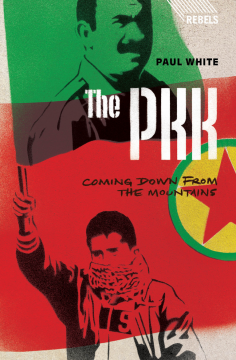
Additional Information
Book Details
Abstract
The Kurdistan Workers’ Party (PKK) is infamous for its violence. The struggle it has waged for Kurdish independence in southeastern Turkey has cost in excess of 40,000 lives since 1984. A less-known fact, however, is that the PKK now embraces a non-violent end to the conflict, with its leader Abdullah Öcalan having ordered a ceasefire and engaging in a negotiated peace with the Ankara government. Whether these tentative attempts at peacemaking mean an end to the bloodshed remains to be seen, but either way the ramifications for Turkey and the wider region are potentially huge.
Charting the ideological evolution of the PKK, as well as its origins, aims and structure, Paul White provides the only authoritative and up-to-date analysis of one of the most important non-state political players in the contemporary Middle East.
Dr Paul White works as an independent consultant in Jakarta, Indonesia. He has taught Middle East Politics courses at Deakin University in Melbourne; at Macquarie University in Sydney; and at the University of Sydney’s Centre for Peace and Conflict Studies. He is the author of Primitive Rebels or Revolutionary Modernizers? The Kurdish National Movement in Turkey (Zed Books, 2000). He was a member of the editorial board of the Journal of Arabic, Islamic and Middle Eastern Studies and serves on the board of directors of the Kurdish Institute, Washington DC.
'At this most dramatic moment in the history of the Kurdish people, Paul White's timely book offers an indispensable guide to the PKK's organizational and ideological evolution, its years of bitter struggle with the Turkish state, and the prospects for a peaceful outcome.'
Bill Park, King's College London
'A timely analysis of the evolution of the Kurdish national movement and the PKK over the last fifteen years, which reveals important insights into the complex history and dynamics of the conflict ... a key resource for anyone seeking an in-depth understanding of the Kurdish Question.'
Kerim Yildiz, director of Democratic Progress Institute
'Turkey's politics and the Kurdistan Workers' Party have all changed a great deal in the last fifteen years, and Paul White elegantly and clearly traces these changes. Of interest to both academics and non-academics, his extremely timely and important book will help readers better understand the current context - and how it came to be.'
David Romano, author of The Kurdish Nationalist Movement
Table of Contents
| Section Title | Page | Action | Price |
|---|---|---|---|
| Front Cover | Front cover | ||
| Rebels | i | ||
| About the Author | ii | ||
| Title Page | iii | ||
| Copyright | iv | ||
| Contents | v | ||
| Glossary of Organizations, Cities and Towns | vi | ||
| Glossary of Key Figures | ix | ||
| Chronology of Significant Events | xii | ||
| Introduction | 1 | ||
| 1: ‘The Time of Revolution Has Started’ | 5 | ||
| Figure 1 Map of Kurdistan | 6 | ||
| Precursors of the PKK | 8 | ||
| Emergence of the Modern Kurdish National Movement | 9 | ||
| The Catalyst of Racist Provocation | 11 | ||
| 2: PKK Origins and Ideological Formation | 16 | ||
| From Disorientation to Refounding | 18 | ||
| The PKK’s Organization and Membership | 23 | ||
| 3: Early Years of Struggle | 29 | ||
| Towards Armed Struggle | 30 | ||
| Armed Struggle Unfolds | 31 | ||
| The PKK in Europe | 34 | ||
| 4: From Ceasefire to All-Out War | 42 | ||
| The Unilateral Ceasefire Ends | 44 | ||
| The 2009 ‘Kurdish Opening’ | 50 | ||
| 2010: Serok Abandons Rapprochement with Turkey | 54 | ||
| Turkey Responds by Bombing PKK Bases in Iraqi Kurdistan | 87 | ||
| The Kurdish Diaspora’s Role | 89 | ||
| Breaking the Deadly Pattern? | 97 | ||
| 5: The Move Towards Peace | 100 | ||
| 31 December 2012: Peace Negotiations Announced | 100 | ||
| Turkish Responses to the Turkish/Kurdish Peace Process | 104 | ||
| Peace: Reality or Illusion? | 124 | ||
| 6: Democratic Confederalism and the PKK’s Feminist Transformation | 126 | ||
| From Independent Kurdistan to ‘Democratic Confederalism’ | 126 | ||
| Transformation into an Autonomist Movement of Democratic Confederalism | 129 | ||
| Repression of the KCK | 133 | ||
| The PKK and Women | 133 | ||
| The PKK’s Feminist Transformation | 136 | ||
| PKK Women’s Organizations | 140 | ||
| A Radical Transformation | 148 | ||
| 7: Coming Down from the Mountains | 150 | ||
| From Terrorists to Legitimate Rebels? | 151 | ||
| Economic Factors | 153 | ||
| A ‘Turkish Spring’? | 156 | ||
| Return to Armed Conflict? | 157 | ||
| References | 168 | ||
| Index | 192 | ||
| Back Cover | Back cover |
